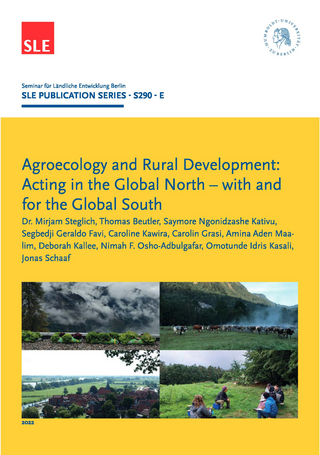
Agroecology and rural development: acting in the Global North - for and with the Global South
Steglich, Mirjam / Thomas Beutler / Saymore Ngonidzashe Kativu et al.Externe Publikationen (2022)
Berlin: Humboldt-Universität zu Berlin SLE Postgraduate Studies on International Cooperation for Sustainable Development
ISBN: 978-3-947621-32-3
DOI: https://doi.org/10.18452/25187
Open access
Three interlinked crises of global dimension—climate change, biodiversity loss, and unsustainable food systems—put increasingly high pressures on land and people. Identified as the land use trilemma because they occur simultaneously and require integrated solutions, these major challenges must be addressed in rural areas. Approaches that focus on one of these crises in isolation insufficiently address the complexity of these challenges which have important social, ecologi-cal, and economic implications. Integrated solutions or multidimensional, multiple win–win strategies must be developed. The Global North increasingly recognises the need to take responsibility for the global ecological emergency that is emerging predominately as the result of its past and present actions (Hickel, 2020). Inhabitants of the Global North have begun to understand the consequences of their high living standards as an out-come linked to the economic growth paradigm now pursued in many parts of the world. While most countries in the Global South remain within their boundary fair shares, they have started to follow the Global North’s path, amplifying their con-tribution to the ecological crisis. Hence, transformation strategies in rural areas need to be elaborated and applied in all parts of the world. In this study, we explore agroecology as a holistic approach for agri-food sys-tem transformation and sustainable rural development. Our aim is to contribute to a better understanding of how the Global North can translate recognition of its responsibility as a key contributor to the climate crisis, biodiversity loss, and un-sustainable food systems globally into action locally. These local actions must be informed by greater awareness about positive and negative distance effects (tele-coupling) in the Global South and, more precisely, local requirements and oppor-tunities for the global co-creation of knowledge to foster the Global North’s ability to take action with and for the Global South. We anticipate a growing need for joint North–South learning and co-creation of knowledge to “think globally and act locally” in an interconnected world. While agroecology’s potential is increasingly recognised, its actual contribu-tions in the Global North and implication for rural development are not yet well understood. Firstly, important knowledge gaps and misunderstandings exist con-cerning the concept and its approach. This is particularly evident in the fact that a standard definition and certification system, as used in organic farming does not exist for products grown according to agroecological principles. Methodologies for assessing agroecological practices and measuring the reduction of negative local and distant effects in the Global South have not yet been put into practise.

